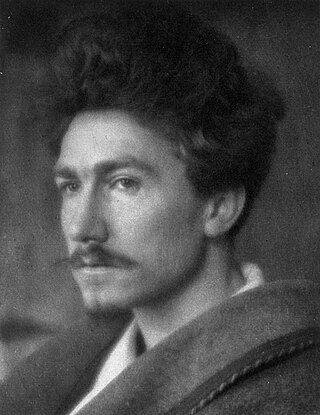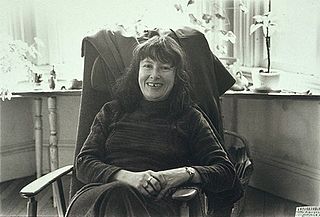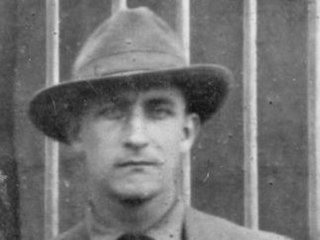
William Carlos Williams was an American poet, writer, and physician closely associated with modernism and imagism.

Cat on a Hot Tin Roof is a three-act play written by Tennessee Williams. An adaptation of his 1952 short story "Three Players of a Summer Game", the play was written by him between 1953 and 1955. One of Williams's more famous works and his personal favorite, the play won the Pulitzer Prize for Drama in 1955. Set in the "plantation home in the Mississippi Delta" of Big Daddy Pollitt, a wealthy cotton tycoon, the play examines the relationships among members of Big Daddy's family, primarily between his son Brick and Maggie the "Cat", Brick's wife.

Imagism was a movement in early-20th-century Anglo-American poetry that favored precision of imagery and clear, sharp language. It is considered to be the first organized modernist literary movement in the English language. Imagism is sometimes viewed as "a succession of creative moments" rather than a continuous or sustained period of development. The French academic René Taupin remarked that "it is more accurate to consider Imagism not as a doctrine, nor even as a poetic school, but as the association of a few poets who were for a certain time in agreement on a small number of important principles".

Priscilla Denise Levertov was a British-born naturalised American poet. She was a recipient of the Lannan Literary Award for Poetry.

Paterson is an epic poem by American poet William Carlos Williams published, in five volumes, from 1946 to 1958. The origin of the poem was an eighty-five line long poem written in 1926, after Williams had read and been influenced by James Joyce's novel Ulysses. As he continued writing lyric poetry, Williams spent increasing amounts of time on Paterson, honing his approach to it both in terms of style and structure. While The Cantos of Ezra Pound and The Bridge by Hart Crane could be considered partial models, Williams was intent on a documentary method that differed from both these works, one that would mirror "the resemblance between the mind of modern man and the city."

Robert Menzies McAlmon was an American writer, poet, and publisher. In the 1920s, he founded in Paris the publishing house, Contact Editions, where he published writers such as Ernest Hemingway, Gertrude Stein, James Joyce and Ezra Pound.

James Laughlin was an American poet and literary book publisher who founded New Directions Publishing.

Pictures from Brueghel and Other Poems is a 1962 book of poems by the American modernist poet/writer William Carlos Williams. It was Williams's final book, for which he posthumously won the Pulitzer Prize for Poetry in 1963. Two previously-published collections of poetry are included: The Desert Music and Other Poems from 1954 and Journey to Love from 1955.

New Directions Publishing Corp. is an independent book publishing company that was founded in 1936 by James Laughlin and incorporated in 1964. Its offices are located at 80 Eighth Avenue in New York City.

Spring and All is a volume of poems by William Carlos Williams, first published in 1923 by Robert McAlmon's Contact Publishing Co.
Latino poetry is a branch of American poetry written by poets born or living in the United States who are of Latin American origin or descent and whose roots are tied to the Americas and their languages, cultures, and geography.

Harold Norse was an American writer who created a body of work using the American idiom of everyday language and images. One of the expatriate artists of the Beat generation, Norse was widely published and anthologized.

The Penn State University Press, also known as The Pennsylvania State University Press, was established in 1956 and is a non-profit publisher of scholarly books and journals. It is the independent publishing branch of the Pennsylvania State University and is a division of the Penn State University Library system. Penn State University Press publishes books and journals of interest to scholars and general audiences. As a part of a land-grant university with a mandate to serve the citizens of the commonwealth of Pennsylvania, it also specializes in works about Penn State University, Pennsylvania, and the mid-Atlantic region. The areas of scholarship the Press is best known for are art history, medieval studies, Latin American studies, rhetoric and communication, religious studies, and Graphic Medicine. In 2016 the Press launched PSU Press Unlocked, an open access platform featuring over 70 books and journals. The Press acquired academic publisher Eisenbrauns, which specializes in ancient Near East and biblical studies, in November 2017. Eisenbrauns continues to publish as an imprint of the Press.
Nationality words link to articles with information on the nation's poetry or literature.

"This Is Just to Say" (1934) is an imagist poem by William Carlos Williams. The three-versed, 28-word poem is an apology about eating the reader's plums, written as if it was a note left on a kitchen table. It has been widely parodied.

Al Que Quiere! is a collection of 52 poems by William Carlos Williams, published in 1917 by the Four Seas Company of Boston, Massachusetts. Williams paid $50 to the publisher. The original edition announces, "Many of the poems in this book have appeared in magazines, especially in Poetry, Others, The Egoist, and The Poetry Journal."
Alvin Lustig was an American book designer, graphic designer and typeface designer. Lustig has been honored by the American Institute of Graphic Arts and the Art Directors Club Hall of Fame for his significant contributions to American design.
Samuel Williams, better known by his pen name Sam Aleckson, was an American slave and author of Before the War and After the Union: An Autobiography. Like his father, Alexander Williams, his mother, Susan Williams, and his grandfather of the same name, Samuel Williams was born into slavery in 1852 in Charleston, South Carolina. His great-grandfather, Clement Williams, was brought from Africa in the Atlantic slave trade. Samuel Williams' memoir offers a rare look into the lives of the urban enslaved in North America and the ways freedmen negotiated their ways through Reconstruction and into the 20th century. Samuel Williams had the great fortune of being taught the three "R's" by his owners. Once freed, he used his literacy to document his life and obtained publication in 1929. Williams quotes Shakespeare to readers of his autobiography by drawing from Othello: "I will a plain unvarnished tale deliver," a line often used in slave narratives but powerful here. The humbleness of this phrase belies a thoughtful, complex life story. While his memoir was actually published in 1929, Williams claims to have composed it in 1914 during a time when he feared he might go blind and wanted to document his life before that occurred. However, he did not go blind, and lived on for several more decades, most likely dying in Massachusetts in 1946.
Contact was an American literary "little magazine" published during the early 1920s and again in 1932. Following their introduction in 1920 by Marsden Hartley at a party hosted by Lola Ridge, William Carlos Williams and Robert McAlmon endeavored to create an outlet for works showcasing Williams' theory of "contact", a theory centered on the belief that art should derive from an artist's direct experience and sense of place and should reject traditional notions of value. Williams desired to create a distinctly American form of art free of the literary tradition running throughout the work of T. S. Eliot.
Thomas Canning was a composer and music educator, serving as a professor of composition and music theory at the Eastman school and as composer-in-residence at West Virginia University. He also held appointments at Morningside College, Indiana University of Pennsylvania, and the Royal Conservatory of Music. In his composition work, he created music for specific occasions or ceremonies, focusing on hymns and choral works, and collaborated with poets Robert Frost and William Carlos Williams to create music in conjunction with their works. His best-known orchestral work, Fantasy on a Hymn by Justin Morgan (1944), was recorded by Leopold Stokowski and Howard Hanson.













